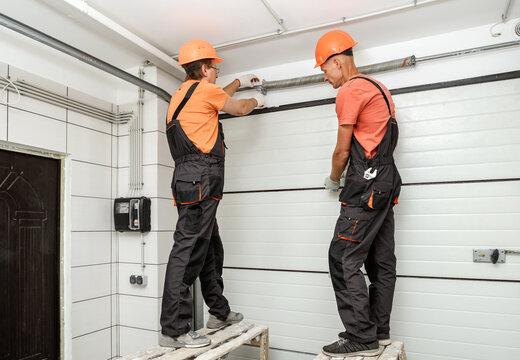A malfunctioning garage door opener can be a source of frustration for homeowners. If you find yourself in a situation where your garage door opener won’t close all the way, understanding the possible causes and solutions is crucial. In this comprehensive guide, we will explore the reasons behind this issue and provide practical tips to get your garage door closing smoothly.

Diagnosing the Problem – Garage Door Opener Won’t Close All the Way
When your garage door opener refuses to close completely, several factors could be contributing to the problem. Let’s investigate the common issues associated with “Garage Door Opener Won’t Close All the Way”:
- Misaligned Safety Sensors: Garage doors are equipped with safety sensors that prevent them from closing if an obstruction is detected. Misaligned sensors can give a false signal, causing the door to stop prematurely. Check the alignment of the sensors and ensure they are clean and free from obstructions.
- Limit Switch Adjustment: The limit switch on your garage door opener controls how far the door travels during both opening and closing. If the switch is misadjusted, it may prevent the door from closing fully. Consult your opener’s manual to learn how to properly adjust the limit switch.
- Obstructions in the Door’s Path: Even small objects in the door’s path can trigger the safety mechanism and prevent it from closing. Inspect the area around the door for any debris, tools, or other items that might be obstructing the path.
- Worn-Out Rollers or Hinges: If the rollers or hinges on your garage door are worn or damaged, they can impede the smooth movement of the door. Inspect these components and replace any that show signs of wear.
- Issues with the Garage Door Tracks: Misaligned or damaged tracks can hinder the door’s movement. Examine the tracks for any misalignments, gaps, or damage. Make the necessary adjustments or repairs to ensure the door glides smoothly along the tracks.
Solutions for a Smooth Closure
Now that we’ve identified potential issues, let’s explore practical solutions to address the “Garage Door Opener Won’t Close All the Way” problem:
- Sensor Realignment: Align the safety sensors so that they face each other directly. Clean the sensor lenses and ensure there are no obstructions in their path. This simple adjustment can often resolve the issue.
- Limit Switch Adjustment: Refer to your garage door opener’s manual to locate the limit switch. Make small adjustments as needed, testing the door after each adjustment until it closes completely.
- Clear the Door’s Path: Regularly inspect the area around your garage door and remove any objects that might be blocking its path. This includes tools, toys, or other items that could trigger the safety mechanism.
- Roller and Hinge Inspection: Check the rollers and hinges for signs of wear or damage. Replace any components that are no longer functioning correctly to ensure smooth door operation.
- Track Maintenance: Inspect the tracks for misalignments or damage. Use a level to straighten any misaligned sections and tighten loose bolts. Lubricate the tracks to reduce friction and promote smooth movement.
Conclusion:
A garage door opener that won’t close all the way can be a frustrating problem, but with a systematic approach to troubleshooting and maintenance, you can often identify and resolve the issues. By addressing misaligned sensors, adjusting limit switches, and maintaining the various components of your garage door, you can enjoy a smoothly operating system that provides both convenience and security for your home.



Leave a Reply